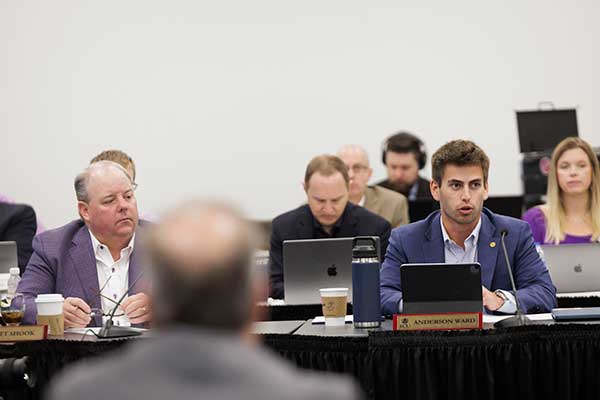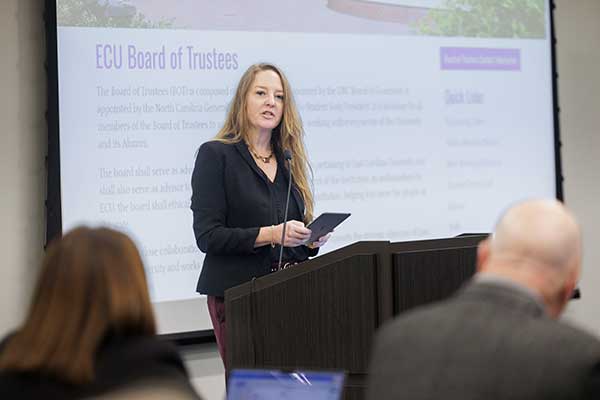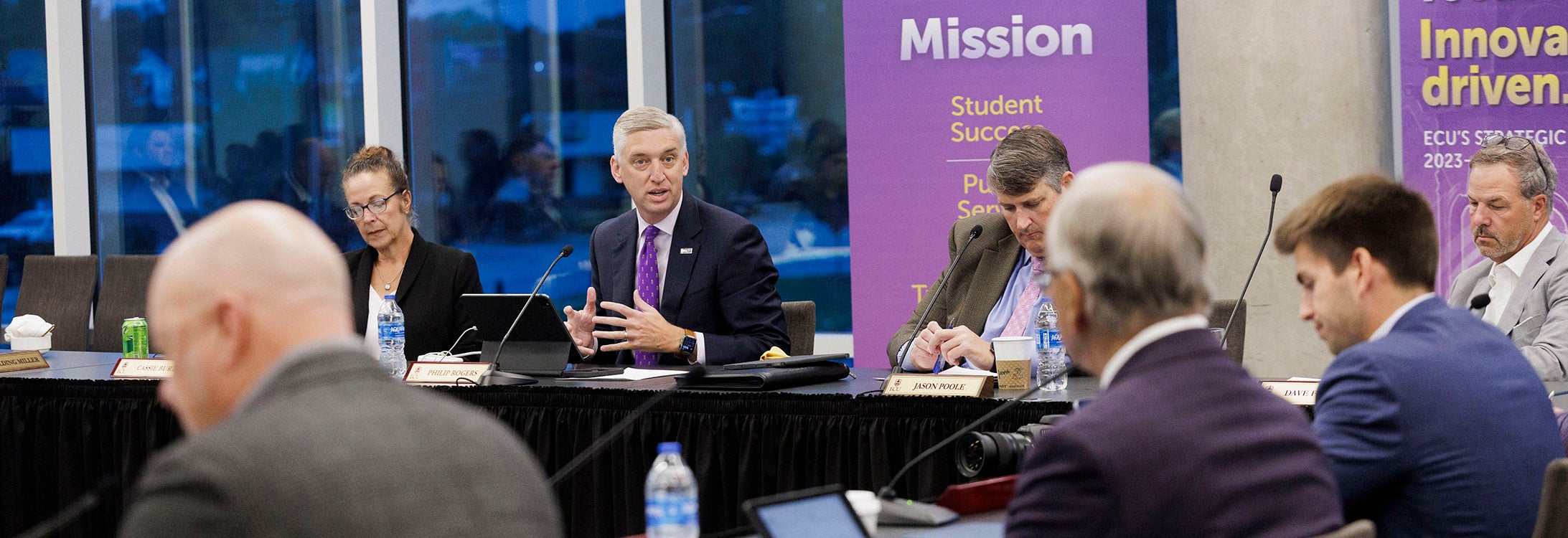Board of Trustees approves Isley Indoor Performance Center
A long-awaited project is one step closer to becoming a reality as the East Carolina University Board of Trustees approved the construction of the Isley Indoor Performance Center as part of its meeting on Thursday and Friday at the Main Campus Student Center.

Student Government Association president Anderson Ward gives his remarks.
The Isley Indoor Performance Center is a 90,000-square-foot indoor practice facility to be used as a multi-sport training facility. It will offer a dedicated practice space designed to meet the training needs of ECU athletic teams and provide an area to host large gatherings. The $24.5 million facility will be funded by the Pirate Club.
Chancellor Philip Rogers acknowledged the board’s approval of the Isley Indoor Performance Center as a critical and important step in realizing a long-awaited initiative for the athletics department. He added that ECU is at the 1-yard line on full approval for the facility. The center will be presented to the UNC System Board of Governors for consideration in October.
Rogers said the donor funding for the $24.5 million facility is an expression of how trust translates into investment in ECU.
“Every single gift matters in making this a reality,” said Rogers.“Those who have given up their treasure to fund this facility are certainly passionate about Pirate athletics and are committed to providing our student-athletes with modern performance resources.”
Jon Gilbert, director of athletics, expressed his appreciation for Lance and Heath Clark, and Bill Clark Homes, for their gift supporting the Isley Indoor Performance Center and other athletics initiatives.
“This most recent gift makes them the largest donors in the history of ECU athletics,” said Gilbert. “Their giving level is unsurpassed.”
Gilbert said their generosity started with their father, Bill Clark. “He has instilled Heath and Lance with their philanthropic giving to ECU,” he said. Gilbert added the Clarks are not only the largest givers to athletics, they are ECU’s largest givers in the NIL (name, image and likeness) space.
In his remarks to the board, Rogers highlighted the Access Scholars luncheon on Sept. 13 as a way ECU demonstrates value across stakeholder groups and shows that ECU remains a good investment.
“A donor hearing directly from a scholar on the transformative gift they received is one of those moments where we bring the value proposition to life,” he said. “It’s both a moment for the recipient to express gratitude and to plant the seed that may lead to a future donor.”
Rogers later highlighted student success enhancements, employee recruitment and retention, research infrastructure, and emerging programs and initiatives as the institution works on long-term fiscal planning.
Student Government Association president Anderson Ward discussed a collaboration with the ECU campus safety team. SGA allocated funding for the Pirate Pathways project that includes the installation of cameras and additional lighting to enhance safety in the College Hill area. The organization also participated in the Good Neighbor Initiative in August with the city of Greenville, Greenville Police Department, ECU Police Department and the Tar River University Neighborhood Association.
Ward highlighted the beginning of the Pirate Kits program that is set to begin Oct. 22. The kits are designed to support students in the time between the beginning of an illness and a doctor’s appointment. They contain tea bags, honey, disposable thermometers, facial tissues, disinfecting wipes and other items to help students recover.
Faculty Senate chair Anne Ticknor mentioned the importance of student mentoring during her remarks. She said that students aren’t opposed to being mentored but sometimes it seems scary to them because they didn’t know that is part of their journey as college students.
“When I ask them to attend office hours or I have to meet with them separately or meet in a small group, they’re usually not in trouble. Usually it is me trying to give them additional support, answer questions and mentor them not just through the journey of education but also through this journey of life,” she said.
In addition to the Isley Indoor Performance Center elevations, as part of the consent agenda, the board:
- Approved an adjustment of the housing fee to a non-refundable amount of $135. The fee, which is a reduction from a $100 application fee and a $100 pre-payment when completing a housing application, is designed to reduce a cost barrier as well as save human capital. The request goes to the UNC System Board of Governors for approval.
- Approved HDR Architecture of Charlotte as the design team for the Special Health Needs dental clinic.
- Approved BSA LifeStructurers as the design team for the new regional outpatient behavioral health facility.
- Approved a naming menu of more than 190 opportunities for the new medical education building at the Brody School of Medicine.
- Approved naming proposals for the social work fieldwork offices in the Rivers Building for the Caswell Center Foundation, the naming of a study room in Joyner Library for the Rand family, and the Will Call gate at Clark-LeClair Stadium for the Cole Family.
In other business
Vice Chancellor for Advancement Christopher Dyba told the Athletics and Advancement committee that scholarships are the top priority across University Advancement. Dyba said ECU is launching the Chancellor’s Scholarship initiative to meet that priority.

Faculty senate chair Anne Ticknor speaks to the Board of Trustees.
“First and most importantly, it is the right thing to do for students and it’s also the right thing to do to help us meet our student success metrics,” Dyba said. “When we think about retention, recruitment and graduation rates, all of these student success indicators are aided and advanced through scholarships.”
During the meeting of the Committee on Strategy and Innovation, the board heard an update from Dr. Michael Waldrum, dean of the Brody School of Medicine and CEO of ECU Health, and Robert Greczyn Jr., chair of the ECU Health Board of Directors, on the integration of the hospital system with the medical school and its clinics. Waldrum reported that the partnership has led to numerous improvements, from attracting and retaining providers and faculty to a better patient experience.
“I think we will look back on this integration as one of the seminal moments in the history of ECU,” Greczyn said.
The University Affairs committee heard from a faculty and student panel on how artificial intelligence (AI) can support faculty, enhance student learning and help transform the region.
Dr. Todd Finley, associate professor in the College of Education, told members about the development of an AI research and teaching lab in the college’s Center for STEM Education.
“We’re excited because the big goal here is that we are advancing the idea that all of our graduates are human centered and tech informed,” he said.
Dr. Ciprian Popoviciu, assistant professor in the Department of Technology Systems, leads the college’s Center for IoT (Internet of Things) Engineering and Innovation. He explained that the goal is to enable the research and development of IoT solutions for a wide range of issues. As an example, he cited the use of data sensors to help monitor water quality at a fish farm in real time, thus preventing the death of fish. He said air quality could be measured so that residents with breathing problems can limit their time outdoors if needed.
He said such measures create an educational cycle that enhances student learning while benefiting the community.
“Once students get excited about this, they can innovate,” Popoviciu said.
Provost Robin Coger told committee members about the importance of ECU’s “student success ecosystem” that focuses on five key elements — the student experience, student well-being, the learning environment, professional readiness, and data informed policies, procedures and practices.
“A high-functioning student success ecosystem results in more Pirates graduating on time,” Coger said. “That matters to us and that matters for the student.”
As part of the Budget, Finance and Infrastructure Committee meeting, Stephanie Coleman, vice chancellor for administration and finance, presented final budget metrics from the 2023-24 fiscal year and highlighted metrics from the current fiscal year.
The next meeting of the ECU Board of Trustees is scheduled for Nov. 21-22 in the Main Campus Student Center.
